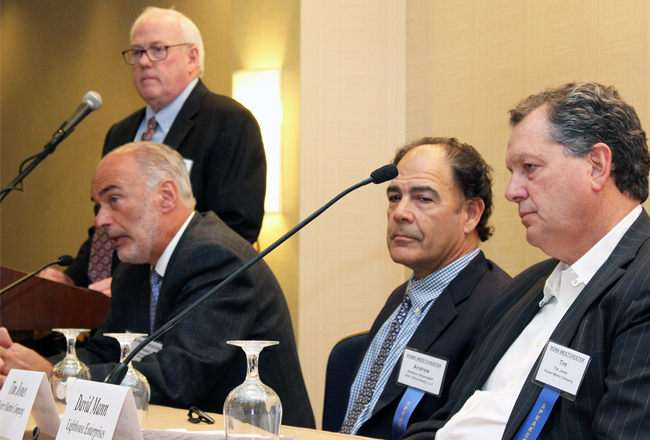
A panel of Westchester County real estate experts had mostly positive things to say about the county’s commercial real estate market at a panel on Jan. 11, but cautioned that there could be some uncertainty ahead with tax changes and signs of a slowdown toward the end of year.
The panel gathered for the Building and Owners Management Association of Westchester County”™s annual luncheon at the Crowne Plaza Hotel in White Plains.
Two years ago, Robert P. Weisz, CEO of RPW Group in Rye Brook, used the 2016 BOMA panel to announce that Hospital for Special Surgery would open an outpatient center at his company’s 1133 Westchester Ave. building.
While no major announcements came from Weisz’s turn on this year”™s panel, he used Hospital for Special Surgery’s successful opening in White Plains this past fall to illustrate the strength of the county’s health care market.
“We have a population that is growing and getting older, and obviously they need more medical services,” Weisz said. “We just had HSS open a facility in one of our buildings… they are packed. They see hundreds of people every single day.”
“Westchester is definitely a perfect market for very extensive medical services in every level,” he said.
Weisz was joined on the panel by Andrew Greenspan, principal of GHP Office Realty, Timothy M. Jones, a partner at Robert Martin Co., and David Mann, the president and founder of Lighthouse Enterprises.
The panelists commented on the overall strength of the county’s office market, which ended 2017 with a 19.6 percent vacancy rate, down from 21.2 percent a year earlier, according to year-end data from Cushman and Wakefield.
That came in a year when some analysts were cautious in their projections, Greenspan said.
“I would say a year later, somewhat to our surprise, everything continued to move toward even what I would say is a higher peak, a higher plateau,” Greenspan said. “2017, I would say for most of the people in the room, was an excellent year, and I believe for most of our tenants they seemed to do well.”
Weisz described the past year and a half as positive for his company, with tenants looking to expand and agreeing to longer lease terms.
Mann, whose Lighthouse Enterprises has developed apartment buildings in White Plains, Port Chester and Harrison over the last seven years, said the multifamily residential market has improved steadily over his time in business.
“Overall, every time I build a 50-unit or a 70-unit building, they all get rented up very quickly,” Mann said.
Meanwhile office building ownership, Greenspan noted, has gotten more competitive.
“You”™ll see local players, who haven”™t traditionally been in the business, getting into the business,” Greenspan said, adding that his company had recently sold an office building to a company previously focused in residential properties.
He said GHP has felt a difference in the office market in the past 90 days.
“We”™ve gotten space back from tenants, who said business isn”™t so good, we need less space,” Greenspan said. “We”™re starting to see a little, maybe, hiccup in terms of how the tenants themselves are doing.”
The full impact the new federal tax bill will have on the market, panelists agreed, remains to be seen.
Jones predicted the federal tax overhaul could contribute to an even larger shift away from home ownership to rental properties. The law limits deduction of state and local income taxes to $10,000.
“Why own a house if you can”™t deduct the real estate taxes?” Jones said. “It”™s going to be tough.”
Mann, meanwhile, said the tax bill could help companies increase wages, allowing landlords to consider raising rents. Rents, he argued, have remained flat while interest rates, construction and land costs have gone up.
“We have a lot of people in our buildings who work at IBM, the hospitals and I do believe the wage increase is going to come,” Mann said. “I don”™t know if it”™s going to be next month or next year. But there will be more money in the system, more money to pay these people. And I think that will help support higher rents.”
Local taxes will be worth keeping an eye on as well, Weisz said. While noting that county taxes only represent about a quarter of a property”™s overall tax burden, Weisz said just the perception of a tax increase could hurt the county’s market.
“From a perception point of view, every time a company is looking on a national level to relocate, Westchester is the highest taxed county in the country,” Weisz said. “So that”™s the first item, it”™s already a no.”
But he said Westchester’s strengths should be able to overcome that perception. To that point, Jones added that Westchester has offered enough services and a quality of life that people have “been willing to pay to be here.”
“But value is a very nebulous thing, and based largely on perception,” Jones said. “So I think we need to learn how to adapt to maintain the momentum with what”™s been a very good value proposition. One that has attracted the Regenerons and the highly educated workforce that”™s really key to our success.”














